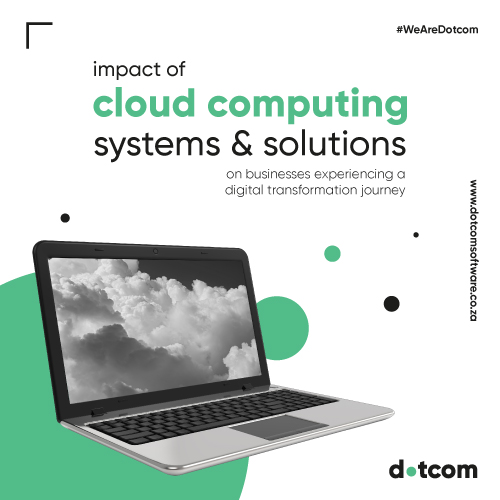


What impact are cloud computing systems and solutions having on businesses experiencing a digital transformation journey?
11th Apr, 2022
Modern businesses are dependent on using technology effectively to support their day-to-day business operations and to innovate new solutions to help them remain competitive.
Cloud computing systems and solutions are vital and have a huge impact on businesses experiencing a transformation journey.
What are some examples of cloud computing services?
Cloud computing is now a way of life for most companies.
Below are some key examples of cloud computing services:
- Salesforce
- Apache Stratos
- Cisco Metapod
- Dropbox
- WebEx
- Microsoft Azure
- Google Drive
- Amazon Web Services
Who uses cloud computing services and service providers?
In this modern age, most people use cloud computing services and service providers:
From the student who uses Google Drive or Dropbox to organise their lecture and study notes, the small start-up with an Amazon Web Services account to keep their invoices in one place, to the large corporation using their own in-house cloud software.
The cloud is primarily used for data storage in a virtual space, facilitating remote access to be used for efficient in-house operations, as a deployment tool for software or services rendered to the public.
Cloud services can be delivered in 3 main ways:
- Public cloud (these are services that are accessible over the internet, such as Google Drive or Dropbox).
- Private cloud (these services are only accessible via the organisation’s internal IT structure).
- Hybrid cloud (a mix between private and public with 2 platforms that interact together seamlessly)
Three main types of cloud computing are:
- Infrastructure-as-a-Service (IaaS)
- Platforms-as-a-Service (PaaS)
- Software-as-a-Service (SaaS)
IaaS
IaaS (Infrastructure as a Service) allows individuals or companies to rent or lease servers to store their vital information in the cloud.
It provides basic networking and storage resources, and the user typically pays on a “pay-as-you-go” basis.
This means that if you suddenly find that you need more capacity to store your data, you can conveniently and quickly buy more.
Unlike SaaS and PaaS computing solutions that are on-demand, IaaS gives users the option of entering into agreements with the service provider.
PaaS
Platform as a Service (or PaaS) provides the user with intricate computing platforms including the following:
- Programming language execution development
- An operating system
- Web servers
- Databases
Using a PaaS service allows one to create personalised, cloud-based apps, organisational apps, and makes managing applications simpler.
With PaaS, you can quickly build all the applications you need without having to spend a lot of money on costly computing resources as everything you need is on the platform.
Most PaaS platforms allow the user to pay only for what they need or use, so there is no risk of overspending on essential apps.
SaaS
Most people are familiar with SaaS services as examples of these include data storage services, such as Dropbox and Google Drive.
Instead of storing your data in software that you download, you can simply visit the platform’s website and upload your data there.
SaaS is easy to use and you don’t have to worry about maintaining the platform because it is all done for you.
You also have the option of customisation according to your needs, and the costs are typically low.
Cloud computing as explained by Microsoft Azure is the delivery of computing services – including servers, storage, databases, networking, software, analytics, and intelligence – over the internet (“the cloud”) to offer faster innovation, flexible resources, and economies of scale.
As you can see, cloud computing offers many advantages. Below are some additional benefits of cloud computing:
- They give companies a competitive advantage. In this competitive market, it’s ahead of its competitors. Cloud computing systems help employees work faster, and more effectively, which can give them the leading edge against rival organisations.
- They make disaster recovery easier. A company’s critical data can easily be destroyed by a fire, natural disaster, or power outage. Cloud computing systems, however, keep the company’s data more secure by providing solid backups that can be easily retrieved if needed.
- They provide excellent mobility and convenience. Gone are the days when employees could only access important documents and information on their work computers. Today, cloud computing allows workers to access vital information on cell phones, tablets, and laptops with just an internet connection.
- They allow for more collaboration. Cloud computing makes team collaboration fast and convenient. It allows teams to view, edit, and create work on a central platform, and provides a way for team members to communicate with one another on the platform, and save time.
Noted benefits of implementing Cloud Computing Services and Solutions into businesses for the future of a digitised working and servicing environment:
- High Speed
- Quick Deployment
- Automatic Software updates
- Automatic Software Integration
- Efficiency
- Cost Reduction
- Data Security
- Scalability
- Collaboration
- Unlimited Storage Capacity
Dotcom is a Cloud Services and Solutions company delivering expertise in cloud computing-based services, products, and solutions.
As a Microsoft partner, our software solutions can be customised and allow you to retain complete control during the development life cycle.
Dotcom is also proud to be a Cloud Solutions Provider (CSP) and we are well-versed in delivering innovative solutions for all your cloud computing requirements.
We can also assist with the following:
- Website and web app development
- Mobile app development
- AI and machine learning
- Data and analytics
- And more!
Dotcom cloud migration involves the transitioning of systems and data to a suitable cloud platform following an in-depth assessment of requirements including:
- Cloud exploration and business value assessment
- Bespoke Microsoft cloud systems design
- Cloud architecture and operations assessment
- Application modernisation using azure
- Microsoft Azure application service
- Business solution consulting
We assist our more traditional clients with their delivery needs in the extended Project and Programme Management space while bringing them into the digital transformation and agile space.
If you need assistance, why not contact Dotcom and enquire about our consulting services?
Our team of highly-skilled consultants are passionate about helping businesses reach new heights by providing state-of-the-art solutions.
#dotcomcloudsolutions
#askdotcom

